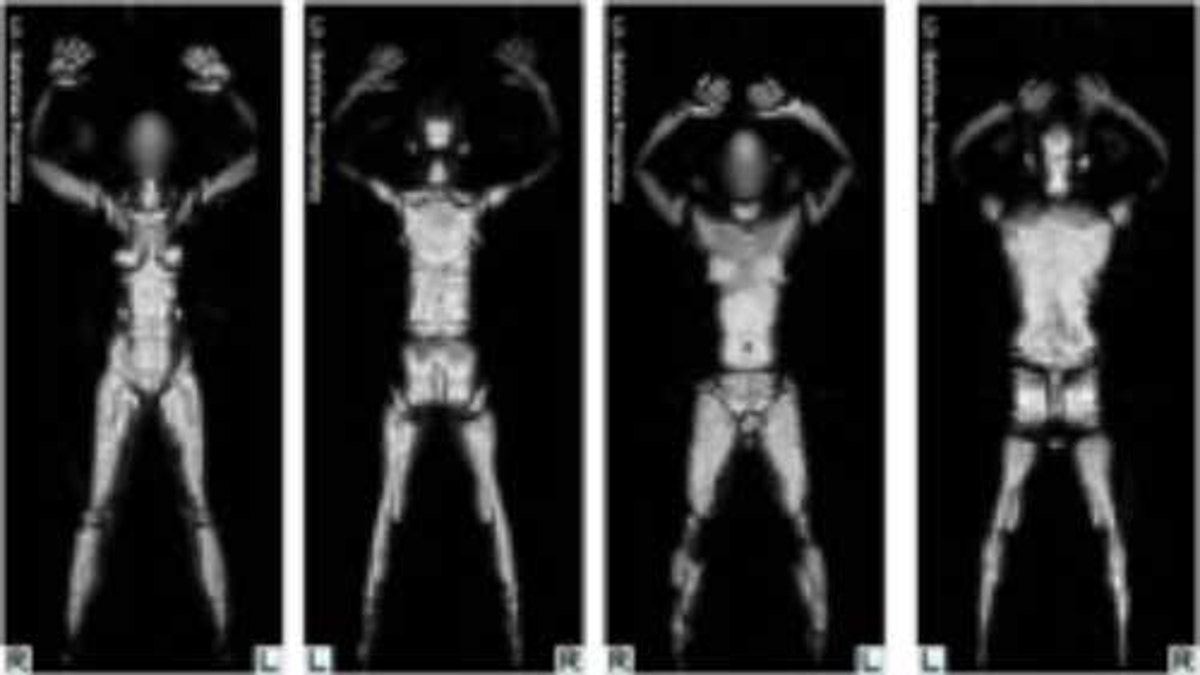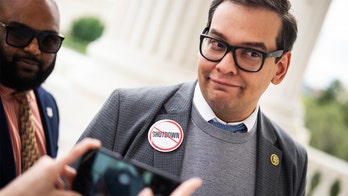
Millimeter wave technology produces images which are viewed by security officials in a remote location. (TSA)
The federal government's efforts to beef up airport security amid increasing terror threats is sparking a growing backlash among airline passengers, labor unions and advocacy groups who say the "naked strip search" machines or aggressive pat-downs that screeners use go too far.
"They have wide discretion but they don't have unlimited discretion," said John Verdi, senior counsel with the Electronic Privacy Information Center, or EPIC, a privacy advocacy group that is challenging the government in court.
Last month, the Transportation Security Administration began a slow rollout of high-tech body scanners, funded by $73 million in federal stimulus funds, that give screeners the ability to see beneath a passenger's clothing while they search for weapons. The devices use a low dose of radiation to create a computerized image of a person's body.
"Advanced imaging technology is an integral tool in TSA's layered counterterrorism approach that enables us to stay ahead of evolving threats to aviation security," TSA Administrator John S. Pistole said in a written statement. "We remain committed to deploying imaging technology to protect the traveling public."
At the same time, screeners began "enhanced" pat-downs of airline passengers who opt against the body scanner or set off a metal detector. The new searches require screeners to touch passengers' breasts and genitals.
The TSA says more than 98 percent of passengers chose body scans over other screening measures. The agency cites experts who say a body scan likely would have detected the powdered explosive that terror suspect Umar Farouk Abdulmutallab allegedly stuffed in his underwear and ignited aboard a flight from Amsterdam to Detroit on Christmas.
But Verdi calls that claim bogus.
"We believe the program is unlawful, invasive and ineffective," he told FoxNews.com. "Frankly, I cannot believe that the people who advocating this program are still citing the Christmas Day bomber as justification when it's clear that attempt wouldn't have been foiled by those machines."
Verdi of EPIC said the machines would have shown the underwear but not the bomb sewn inside of it.
"It can't penetrate that far," he said.
EPIC filed its lawsuit against TSA in July, seeking an emergency suspension of the program. A judge wouldn't grant the suspension but allowed the case to proceed on a nonemergency basis.
"We have an extremely strong case," Verdi said. "The real question is how much authority does TSA have to conduct searches at U.S. airports. Is it unfettered or are there limits? If the court blesses this, they will be saying they can do anything."
There are 385 body scanners at 68 airports around the country. TSA plans to have a total of 450 in use by the end of year and another 500 by the end of the year.
The House passed a bill in June 2009 saying that "whole-body imaging technology may not be used as the sole or primary method of screening a passenger." But it has stalled in the Senate and is unlikely to be considered in the lame duck session.
Citizens are now taking matters into their own hands.
A website has designated Nov. 24, the day before Thanksgiving and one of the busiest travel days of the year, as National Opt-Out Day. The website urges citizens to opt out of the body scan and submit to a pat-down in public.
"The goal of National Opt Out Day is to send a message to our lawmakers that we demand the change," the website says. "No naked body scanners, no government-approved groping. We have a right to privacy and buying a plane ticket should not mean we're guilty until proven innocent."
Pilots' unions are urging their members to avoid body scanners at airports out of health concerns from exposure to the scanner's radiation.
Unions that represent pilots for American Airlines and US Airways, representing a total of 16,500 pilots, say they want a more efficient screening process for pilots instead of having them pass through the security procedures used for passengers.
Pilots have compared the new pat-downs to "sexual molestation."
A TSA spokesman said the agency will have further discussions with pilots about its security policies.
"We are frequently reminded that our enemy is creative and willing to go to great lengths to evade detection," the spokesman said in a statement.
Last month, a Memphis pilot refused to be "harassed or molested without cause" by security agents. He may now lose his job for refusing a pat down and full body scan. He is considering filing a lawsuit.
The Council on American-Islamic Relations (CAIR) issued a travel advisory on Wednesday for airline passengers who may face the pat-downs.
"Travelers are being asked to educate themselves about the new policy and to know their rights if asked to undergo security pat-downs," the group said. "CAIR's advisory is particularly important for Muslim travelers leaving for or returning from Hajj because of concerns that they will be singled out for secondary screening by security personnel."
CAIR said its offices have received complaints about the new pat-downs, particularly from travelers who wear a hijab, or headscarf.
"Passengers who have undergone the new pat-down procedure have reported feeling humiliated by a search they describe as invasive and that has involved TSA officers touching the face and hair, the groin area and buttocks, and in between and underneath breasts."
CAIR said Muslim travelers have the right to request the manual search be conducted in private and to be screened by an officer of the same gender.
TSA's official blogger, Bob, this week shot down accusations of sexually charged pat-downs.
"There is no fondling, squeezing, groping, or any sort of sexual assault taking place at airports," Bob wrote. "You have a professional workforce carrying out procedures they were trained to perform to keep aviation security safe."




